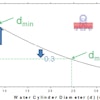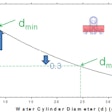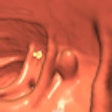CHICAGO - Women waiting to undergo a breast cancer biopsy suffer more anxiety than those waiting to undergo palliative cancer procedures, according to a study from Harvard Medical School presented at the RSNA meeting.
"We were surprised to find that in addition to greater anxiety, the level of depression is similar for women undergoing a breast cancer biopsy procedure, a palliative liver cancer embolization, and an embolization for fibroid treatment," said Elvira Lang, MD, associate professor of radiology at Harvard Medical School in Boston.
"Uncertainty is a greater stressor than awaiting risky treatment," Lang said during a press briefing. "The invasiveness of a procedure has less influence on stress."
She and colleagues wanted to determine which patients experienced high levels of stress while they awaited various forms of treatment. They determined to test only women because the greater proportion of the 214 subjects in the study were undergoing breast biopsies.
The researchers enrolled 112 women undergoing a breast biopsy, along with 60 women who were undergoing uterine fibroid embolization and 42 who were undergoing hepatic chemoembolization. "Liver embolization is basically a palliative procedure for a disease that is incurable, yet these women showed less anxiety than those having the breast biopsy," said Bob Kerlan, MD, chief of interventional radiology at the University of California, San Francisco. Kerlan moderated the press briefing at which Lang presented her results.
After conducting a series of psychological studies, Lang and colleagues found that on the State-Trait Anxiety Inventory, breast biopsy patients had a score of 48 -- significantly higher than the mean score of 26 (p < 0.001) for those undergoing chemoembolization for liver cancer and a score of 24 among the fibroid patients (p < 0.001).
In addition, on the Perceived Stress Scale, the women awaiting a breast biopsy had a score of 18, significantly higher than a score of 15 (p < 0.01) for women who were undergoing liver embolization -- a procedure known to be involved in advanced cancer treatment.
"Waiting for a breast biopsy was a greater stressor in terms of anxiety and perceived stress than awaiting a much riskier invasive treatment for known cancer," Lang pointed out.
Measures of depression and event impact -- how often the test creeps into everyday thought, for example -- were similar for all patients and typically well above normal scores, although they were generally higher for breast biopsy patients.
Lang said doctors should work to diffuse the stress of the patients waiting for diagnostic procedures and diagnoses. She suggested that doctors avoid comments that have a negative connotation such as "it's not that bad." She also suggested physicians and the entire office staff work to offer positive reinforcement to patients
"Anybody who's ever gone even to have just a chest x-ray worries about the results," Kerlan said. "Getting lessons on how to make those experiences more positive would be a powerful thing."
He said the area of research that Lang is exploring is "going to be of increasing importance." The study was supported by the National Center for Complimentary and Alternative Medicine of the National Institutes of Health in Bethesda, MD, and the U.S. Army Medical Research and Materiel Command at Fort Detrick.
By Edward Susman
AuntMinnie.com staff writer
November 30, 2010
Copyright © 2010 AuntMinnie.com



